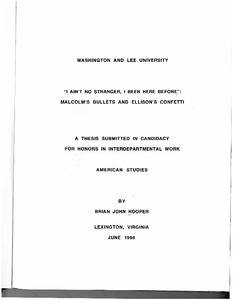| dc.rights.license | In Copyright | en_US |
| dc.creator | Hooper, Brian John | |
| dc.date.accessioned | 2023-10-20T18:00:48Z | |
| dc.date.available | 2023-10-20T18:00:48Z | |
| dc.date.created | 1998 | |
| dc.identifier | WLURG038_Hooper_thesis_1998 | |
| dc.identifier.uri | https://dspace.wlu.edu/handle/11021/36450 | |
| dc.description.abstract | Contemporary cultural debates demand a close reading of Ellison's essays and Malcolm's oratory. For both within and without the academy issues of nationalism, identity, and "multiculturalism" are at the fore of discussion. While it is certainly true, as literary critic Kwame Appiah has observed, that "[in] the 1990s ... 'race,' 'class,' and of such concerns from the (post)modern mind appears highly unlikely. [1] As literary and cultural critic Henry Louis Gates, Jr. has written: "Ours is a late-twentieth-century world profoundly fissured by nationality, ethnicity, race, class, and gender."[2] British-born scholar Os Guinness has examined this phenomenon in the American context and alarmingly describes what he calls the contemporary American "crisis of national identity" . . . Not only are Ellison and Malcolm two contemporary thinkers who speak directly to such questions of identity, but also both are keenly aware of the nature and implications of these controversies: what is at issue is nothing less than the nature of American reality. The analyses that Ellison and Malcolm offer on the constitution of that reality -- indeed, the very meaning(s) of America itself -- stand in direct opposition to one another. For while Malcolm's hyperbolical orations provide perhaps the most incisive
rejection of America and American identity articulated this century, Ellison exuberantly celebrated the constant process of ethnic fusion and democratic leveling he saw as constituting the essence of American culture, a culture to which he lent his unqualified support. This study explores these two strains of cultural thought through an examination of the respective discourses -- the writings, speeches, and interviews -- of Ralph Ellison and Malcolm X. More specifically, this thesis identifies both the implicit and explicit arguments that emerge from these corpuses as they function to interrogate what Ellison calls "Americanness," or American identity. All other concerns are secondary. . . . Chapter One introduces Ralph Ellison and Malcolm X and briefly roots their ideas in the context of African-American intellectual and cultural history. Chapter Two provides a close reading of Ellison's corpus of criticism, focusing on his notion of the melting pot and what he calls "Americanness." In Chapter Three I examine the thought of Malcolm X -- squarely in the the African-American vernacular tradition -- by closely reading selected speeches and public statements. In the conclusion I evaluate Malcolm and his legacy in light of Ellison's theories on American culture and suggest that by analyzing both stances we may discover what Ellison calls "the beautiful and confounding complexities of Afro-American experience."[7] [From Introduction] | en_US |
| dc.format.extent | 80 pages | en_US |
| dc.language.iso | en_US | en_US |
| dc.rights | This material is made available for use in research, teaching, and private study, pursuant to U.S. Copyright law. The user assumes full responsibility for any use of the materials, including but not limited to, infringement of copyright and publication rights of reproduced materials. Any materials used should be fully credited with the source. | en_US |
| dc.rights.uri | http://rightsstatements.org/vocab/InC/1.0/ | en_US |
| dc.subject.other | Washington and Lee University -- Honors in American Studies | en_US |
| dc.title | "I ain't no stranger, I been here before": Malcolm's Bullets and Ellison's Confetti | en_US |
| dc.type | Text | en_US |
| dcterms.isPartOf | WLURG038 - Student Papers | en_US |
| dc.rights.holder | Hooper, Brian John | en_US |
| dc.subject.fast | African Americans -- Civil rights | en_US |
| dc.subject.fast | United States | en_US |
| dc.subject.fast | Ellison, Ralph | en_US |
| dc.subject.fast | X, Malcolm, 1925-1965 | en_US |
| local.department | American Studies | en_US |
